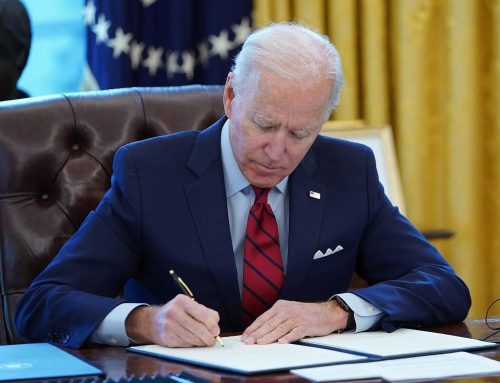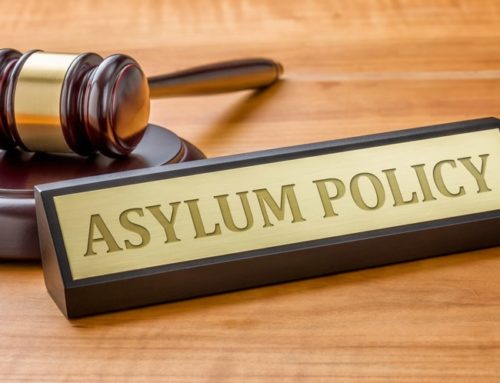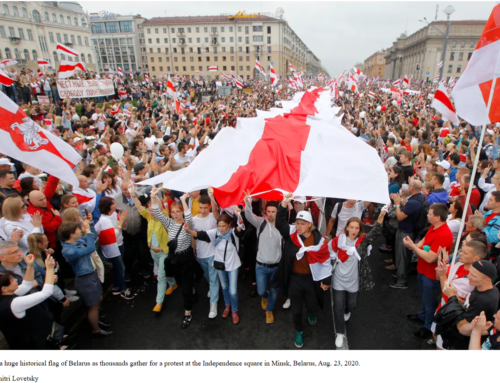LGBTI from Azerbaijan are Increasingly Seeking Asylum
By: Ismail Shahtakhtinski and Aynur Jafar
Azerbaijan has proven to be an inhospitable place for LGBTI. Individuals are targeted based on their sexual orientation and gender identity by Azerbaijani security forces and public in general. LGBTI people face social pressure from the community to conform to binary gender roles—whether they feel at home in those roles or not. Stigma and the threat of physical violence or even death, mean LGBTI Azerbaijani nationals are increasingly seeking asylum.
Repression and asylum seeking
Political migration from Azerbaijan has significantly increased during the last decade. The government is ruled by an authoritarian regime which was transferred from father to son in 2003. This transition was observed with bloody and deadly police violence. Political repressions are common. Freedom House has rated Azerbaijan as Not Free in 2018.[1]
Statistics show the number of people who emigrated from Azerbaijan has increased over two times from 2014 through 2017.[2] Many of them try to seek asylum in Europe and the United States.
During these years, there were lesbian, gay, bisexual, transgender, and intersex (LGBTI) individuals among asylum seekers from Azerbaijan. The number of the members of this group seeking asylum in the United States has increased dramatically after the 2017 LGBTI crackdown by the Azerbaijani government.
I.S. Law Firm observed this increase in its practice and provided legal aid for some LGBTI individuals from Azerbaijan. Our experience shows excessive police violence, torture, ill-treatment, degrading treatment, blackmailing, harassment and other cruel acts by the police.
The nation and its laws
Azerbaijan is a former Soviet Union country located between Europe and Asia. The state declared itself as an independent democratic republic in 1918 which survived 23 months. In 1922, it was occupied by the Soviet Union. In 1991, the country declared independence from the Soviet Union.
According to the State Statistical Committee, the population is over 9 million.[3] Azerbaijan is a secular country with a majority of predominantly Shia Muslims. Actively practicing religion is not very common.
[1] Freedom House, Freedom in the World 2018. See link: https://freedomhouse.org/report/freedom-world/2018/azerbaijan
[2] The Foreign Policy Centre: “Azerbaijan: Challenges to migrants and asylum seekers from the oil-rich state,” December 4, 2017. See link: https://fpc.org.uk/azerbaijan-challenges-migrants-asylum-seekers-oil-rich-state/
[3] The website of the State Statistical Committee of the Republic of Azerbaijan. See link: https://www.stat.gov.az/source/demoqraphy/ap/
Until January 2001, consensual same-sex acts between men were a criminal offense in Azerbaijan.[1] In January 2001, the country became the 43rd member of the Council of Europe and signed the European Convention on Human Rights (ECHR).[2] Article 14 of the ECHR prohibits discrimination on any ground, including sexual orientation.[3] Since Azerbaijan has become the member of Council of Europe and ratified ECHR, it abolished provision criminalizing homosexuality.[4]
Article 34 of the Constitution of Azerbaijan states that everyone reaching the age specified by legislation shall have a right to marry.[5] Family Code of the Azerbaijan Republic further specifies the right to marriage and defines it as a “free-will alliance of a man and woman, registered in the appropriate body of the executive power.”[6]
So, although discrimination on the basis of sexual orientation and gender identity is not prohibited, same-sex marriage is not allowed by law.
Hostility towards queer and non-cisgender individuals
Despite decriminalization of consensual same-sex act in Azerbaijan, both the government and society have a hostile attitude towards the LGBTI community. There are laws against discrimination. However, they do not cover LGBTI individuals.[10] LGBTI individuals have been the target of harassment, ill-treatment, and persecution both by the government and the society.
In 2016, the International Lesbian, Gay, Bisexual, Trans and Intersex Association (ILGA) ranked the country as the worst place, 49 out of 49, in Europe for the rights of LGBTI members. The 2017 ranking was not better either.[11]
Entrenched gender roles
Azerbaijan has never been the best place for LGBTI individuals. A majority hide their sexual orientation from their families and society. Society is full of stereotypes against homosexuals.
It starts from childhood. If a boy does not answer the society’s masculinity standards and acts effeminate, he will experience judgmental attitudes from his family, neighbors, relatives, teachers, and classmates. Even strangers in public may tease him verbally. Everybody will demand he “be a man,” or “stop being such a girl.”
[4] Equaldex – LGBT Rights in Azerbaijan. See link: https://www.equaldex.com/region/azerbaijan
[5] Azerbaijan and Council of Europe. See link: https://www.coe.int/en/web/baku/field-office
[6] European Convention on Human Rights. https://www.echr.coe.int/Documents/Convention_ENG.pdf
[7] Equaldex – LGBT Rights in Azerbaijan. https://www.equaldex.com/region/azerbaijan
[8] Article 34 of the Constitution of the Azerbaijan Republic.
[9] Article 2 of the Family Code of the Azerbaijan Republic.
[10] U.S. State Department: Country Reports on Human Rights Practices for 2017: Azerbaijan.
[11] Ilga Europe: Profile of Azerbaijan. See link: https://rainbow-europe.org/#8622/0/0
Likewise, if a woman does not conform to the feminine norms of society, she will be judged.[12] It is common for the families to force their homosexual children into straight marriages. As a result of this pressure, numerous young people’s lives were ruined.[13]
The government is not eager to educate society on the psychological, sociological and legislative aspects of homosexuality. Therefore, there is a confusion about homosexuality in society, and some people believe that being gay is disease that can be cured.
Driven to extreme acts
Sometimes, these societal pressures end with suicide. One of the local openly gay artists who is currently an asylee in France shared his experience on how his homosexuality caused family tragedy. He wrote: “My brother vowed to kill me, and then he killed himself.”[14]
The most well-known suicidal act that garnered the attention of the whole country occurred in 2014. LGBTI activist, Isa Shahmarli, committed suicide in his apartment.[15] The twenty-year-old hung himself with a rainbow flag. His last note for his family and society read: “This world is not colorful enough for my colors. Goodbye. I am leaving you. God bless you. This country and this world are not for me. I am going to be much happier now. Tell my mother I loved her very much. You all are responsible for my death.”[16]
Who is responsible? The government or society?
The government leads the hostile societal attitude. Azerbaijani government is intolerant towards LGBTI individuals. It constantly uses them to distract the attention of the people from more significant political and economic problems in the country.
This policy can be observed everywhere starting from broadcasting and social media practices and ending in state institutions.[17] LGBTI individuals cannot enjoy the right to fair trial. Judges have a prejudice against them. In most cases, even lawyers refuse to represent them before courts and law enforcement bodies due to their sexual orientation.[18]
[12]ILGA Europe: “Forced Out: LGBT People in Azerbaijan,” August 2007. See link: http://www.hirschfeld-eddy-stiftung.de/fileadmin/images/dokumente/virtuelle_bibliothek/Forced_Out_LGBT_People_in_Azerbaijan__August_2007.pdf
[14] BBC News: “Eurovision 2012: Azerbaijan’s hays not welcome at home,” September 2011. See link: https://www.bbc.com/news/world-europe-14913247
[15] Huffpost: “Isa Shakhmarli, Azeri Gay Rights Activist, Allegedly Commits Suicide With a Rainbow Flag,” January 2014. Updated February 2016. See link: https://www.huffingtonpost.com/2014/01/23/isa-shakhmarli-gay-activist-dead-_n_4652416.html
[16] https://www.balcanicaucaso.org/eng/Areas/Azerbaijan/The-rainbow-colors-are-not-for-Azerbaijani-taste-148722
[17] U.S. Department of State, 2017 Human Rights Report on Azerbaijan. See link: https://www.state.gov/documents/organization/277385.pdf
[18] Shadow Report by ILGA Europe, G&D, and Global Rights: “The Violations of the Rights of Lesbian, Gay, Bisexual, Transgender Persons in Azerbaijan.” See Report: https://www2.ohchr.org/english/bodies/hrc/docs/ngos/LGBT_Azerbaijan96.pdf
Interrogations, torture, and extortion
The Organized Crimes Unit under the Ministry of Internal Affairs and the Anti-Trafficking Committee are the major state institutions conducting the arrests of LGBTI individuals. They track LGBTI individuals and summon them for interrogation. During these interrogations, some of these people are blackmailed with arrest and torture. Through these blackmail tactics, people are forced to give information about other LGBTI members they know.
In this way, the institutions mentioned above create a chain of targeted people and use their testimonies against each other. They extort money from the summoned people which is an unofficial source of income for employees of those authorities.[19]
LGBTI individuals are among the most vulnerable target group of the Azerbaijani authorities. This was especially severe in 2017. In September 2017, the Azerbaijani police began massive crack-down against LGBTI individuals. From September through to the end of 2017, police arrested and abused dozens of gay, bisexual, and transgender individuals.[20]
The arrested LGBTI individuals were detained in police custody where they were subjected to beatings, insults, degrading treatment, sexual assaults, and torture. Police shaved some of the detainees’ heads to humiliate them. Detained LGBTI persons were also tortured through electric shocks. Some were reportedly raped.
They were forced to pay ransom to the police for their freedom and give out information about other LGBTI members. Detainees, who paid ransom, were released with warnings of police monitoring. Those, who could not pay, were sentenced to 20-45 days in jail.[21] They were forced to sign documents with fabricated charges such as prostitution and obstruction of justice.[22]
False information and government-driven crackdowns
The authorities spread disinformation that the detained LGBTI people had HIV and that the government intended to clean the society from serious diseases by arresting those individuals. However, independent analysis later confirmed this was false. Some human rights organizations compared this crackdown with the one that occurred in the Chechnya region of Russia in April 2017, which was highly criticized by the international community.[23]
Bread and circuses
Following the February 2017 Chechen authorities’ attack on the LGBTI community, several authoritarian regimes in the Eurasia region started using similar attacks. This was done in order to divert attention away from greater issues. It also allowed governing bodies to portray democratic values, often perceived as western values, in a negative way.
[20] U.S. Department of State, 2017 Human Rights Report on Azerbaijan. See link: https://www.state.gov/documents/organization/277385.pdf
[22] The New York Times: “Azerbaijan Detains Dozens of Gay and Transgender People” September 2017. See link: https://www.nytimes.com/2017/09/29/world/europe/azerbaijan-gay.html
The 2017 purge led by Chechen leader Ramzan Kadyrov, quickly became the one and only issue discussed within both Chechnya, and all over Russia. And while this crackdown had worsened Russia’s image, it had also diverted the public’s attention from other important issues. On top of this, Russia initially saw little retaliation from the international community.
Therefore, in September 2017, Azerbaijan followed Russia/Chechnya’s model of LGBTI community attacks. Allowing Azerbaijan’s governing bodies to divert attention from other, far more pressing issues in a violent variation of bread and circuses for the masses.
Human rights for all?
In pro-government media coverage these attacks were shown as rightful actions by the Azerbaijani state. And the LGBTI community was portrayed in a negative way. Following these attacks, some pro-government TV stations started talking about LGBTI rights as the epitome of the so-called western values, which, in their words, Azerbaijan did not need. As a result, the Azerbaijani government also tried to use these attacks to portray human rights values in general in a negative way.
Ismail Shahtakhtinski, Esq. is the founder and principal attorney at I.S. Law Firm, PLLC, an international law firm representing individuals and organizations in a broad range of immigration matters with an emphasis on US asylum law.





